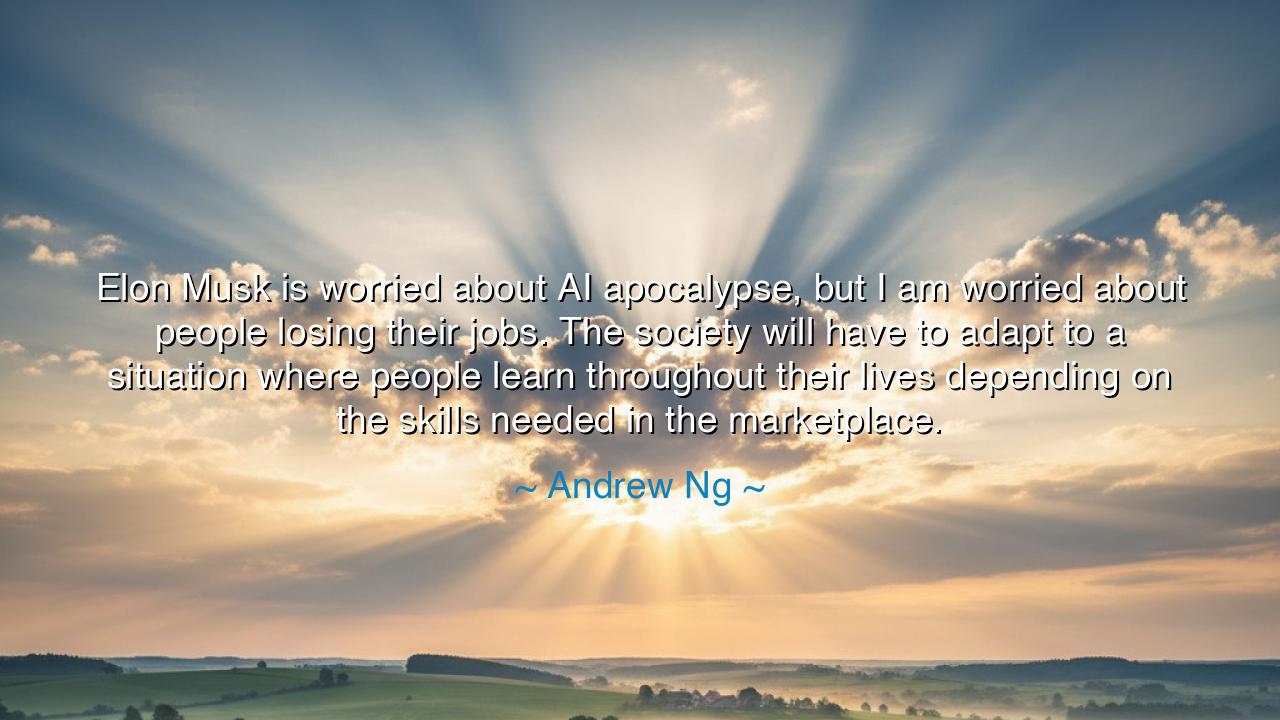
Elon Musk is worried about AI apocalypse, but I am worried about
Elon Musk is worried about AI apocalypse, but I am worried about people losing their jobs. The society will have to adapt to a situation where people learn throughout their lives depending on the skills needed in the marketplace.






"Elon Musk is worried about AI apocalypse, but I am worried about people losing their jobs. The society will have to adapt to a situation where people learn throughout their lives depending on the skills needed in the marketplace." These words from Andrew Ng strike at the very heart of our modern predicament—the rise of artificial intelligence and its potential to reshape society in ways we have not fully grasped. While Musk’s concerns about the AI apocalypse focus on the fear that machines may grow too powerful and take control, Ng’s perspective centers on the more immediate and human concern: how will we, as a society, navigate the economic shifts and job displacement that are already underway? This is not a distant fear, but a present reality that demands our attention. In the face of advancing technology, we must confront the challenge of ensuring that people are not left behind.
In the ancient world, there were also moments of dramatic technological and societal change that led to uncertainty and fear. The Industrial Revolution in England serves as a powerful parallel. As the first machines began to replace the work of craftsmen and laborers, people feared the loss of their traditional livelihoods. Luddite uprisings in the early 19th century were a direct response to the growing sense of anxiety over job displacement. These workers, who felt their skills were becoming obsolete, fought against the machines that threatened their means of survival. The world was changing rapidly, and many could not see how they would fit into this new reality. Yet, over time, the same revolution that caused pain and displacement also led to new industries, new opportunities, and new forms of work.
Similarly, in the days of Plato, the rise of new thinking and the movement from mythology to philosophy also caused great upheaval. Socrates, in his efforts to question and redefine knowledge, was seen as a disruptive force, challenging the status quo. Many of the craftsmen and artisans who relied on traditional methods were forced to confront the new philosophical models that questioned their entire way of life. Socrates did not seek to destroy their world, but to expand it, and in doing so, he invited all of Athens to question the foundation of knowledge, society, and work. The same invitation is before us now as we face the coming wave of automation: how will we adapt, how will we reimagine the world of work, and what skills will we need to thrive in the future?
Ng's words speak not only of economic adaptation but also of the need for a cultural shift in how we think about learning and education. Just as the ancient philosophers urged individuals to continuously seek wisdom, we now face the need to adopt a mindset of lifelong learning. In the past, people learned a trade or skill in their youth and carried it with them throughout their lives. But today’s world requires something different. Technological advancements—from automation to artificial intelligence—demand that we constantly evolve, acquiring new skills and knowledge to stay relevant in a rapidly changing marketplace. The challenge now is not just to provide people with the right skills at the start of their careers, but to create a culture where learning is a lifelong endeavor, woven into the very fabric of society.
Consider the story of Leonardo da Vinci, who is widely celebrated not just for his contributions to art, but for his insatiable curiosity and constant learning across a variety of fields. From painting to anatomy to engineering, Leonardo was not confined to one discipline or career. He exemplified the idea of lifelong learning, always adapting his skills and expanding his knowledge to meet the needs of his time. Leonardo’s versatility was not simply the result of inherent talent; it was the product of a relentless commitment to growth and curiosity—qualities that are crucial for us today as we navigate the rapid pace of technological change.
The lesson of Ng's quote is clear: the future will require us to be adaptive and resilient in the face of constant technological evolution. We must embrace the idea that learning is not something that stops once we leave school or university, but something that continues throughout our lives. As machines take over tasks that once required human labor, we must focus on building skills that are uniquely human—creativity, empathy, critical thinking, and the ability to collaborate. Lifelong learning is not just a necessity; it is a tool for survival in a world where change is the only constant.
In our own lives, let us take this wisdom to heart. Let us not fear the machines or the loss of traditional jobs, but rather see the opportunities that lie in adapting to new challenges. Let us commit to learning, not just as a means to survive, but as a way to thrive in a dynamic world. Whether through formal education, self-directed learning, or hands-on experience, we must embrace the idea that our journey of growth is not bound by the limitations of the past but is limitless, extending through every stage of our lives. The world will change, and we must change with it. The future is for those who are willing to learn, to reimagine, and to adapt—and in doing so, we will shape a world where the human spirit is never displaced, but empowered by the very technologies we create.






AAdministratorAdministrator
Welcome, honored guests. Please leave a comment, we will respond soon